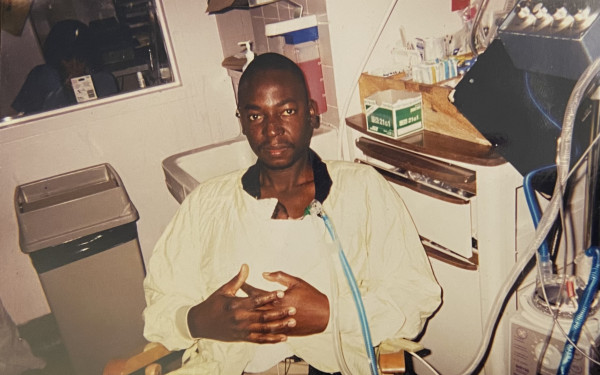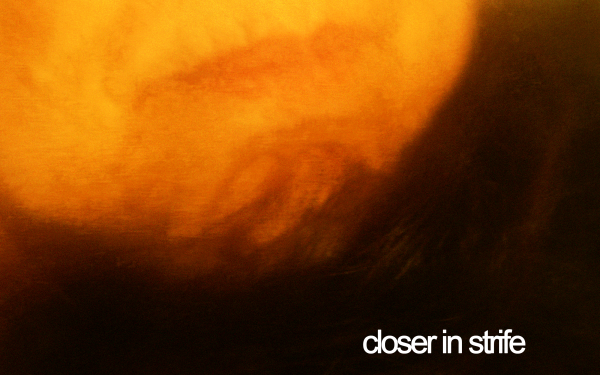A Legacy of Love and Spirits
Finding solace in death through tradition
El cadejo, a supernatural spirit resembling a dog, is a prominent figure in Salvadoran folklore. It roams around isolated roads at night and reveals itself to lonesome travelers in the dark.
There are two of these spirits you might encounter: the white cadejo with blue eyes or the black cadejo with red eyes. The white cadejo appears to travelers as a protector, keeping them safe from harm upon their journey. The black cadejo, however, comes as an omen of death; a sign that the traveler's journey has ended.
Those unfortunate enough to meet the beast are said to be driven to insanity by the dog’s hypnotic red eyes before meeting their untimely death. This is my enduring vision of death: a ferocious, red-eyed hound relentlessly snapping at the heels of my loved ones.
My family was heavily involved in the Salvadoran Civil War—a brutal 12-year conflict that would eventually leave over 75,000 people dead and 8,000 missing from 1979 to 1992. Two of those victims were my mother’s older brothers: ‘mi Tio Jaime y mi Tio Napo’ (my uncle Jaime and my uncle Napo).
My two uncles, sanctified forever in our family’s eyes, stood as my inaugural heroes. In every one of our homes, those identical, faded photographs of two young men were a constant presence. They have been a staple of our hallways for as long as I can remember. Even now, when I conjure images of my uncles, it's those photographs that surface in my mind: my uncles' eyes, unwavering, keeping a watchful gaze over me. I don’t think I ever felt fearful of death then, only sad.
My family’s mourning seemed neverending, and I, too, felt myself missing the family I had never met. They had been ripped away from us. Despite this tremendous loss, however, we found solace. My uncles became divine guardians and would protect us from harm. There was great comfort in believing that someone I had never met loved me and was watching over me. My mother had been the first to share this belief with me. As time marched forward, I realized it was a belief we all embraced; a communal blessing we all got to partake in.
Believing in spirits is a typical practice in Latin America, with the Day of the Dead on Nov. 2 serving as the most prominent illustration. While the celebrations may differ across countries, this holiday holds significant importance for many.
When people envision the Day of the Dead, Mexico's extravagant festivities often come to mind. While those are undeniably beautiful, I have a deep affection for the quieter and more intimate rendition of the holiday observed in El Salvador. Families gather at the cemetery, bringing flowers and food to commemorate the deceased relatives. In El Salvador, cemeteries are adorned with vivid colors and, somewhat ironically, exude a lively atmosphere.
Both my parents go out of their way to send flowers back home, a tradition they have never let go of. Even here, we try to visit the graves of my grandmother and great-aunt and leave them their favorite flowers. The idea of carefully selecting the perfect bouquet for a departed loved one has never struck me as odd; rather it has always felt like a natural gesture. I offer this gift to convey that I continue to think of them, or, at the very least, to avoid the unsettling thought of being haunted by an elderly Latina woman.
Throughout the years, I've encountered skepticism regarding my beliefs: how is it that I don't subscribe to any organized religion, yet still hold faith in spirits? The answer doesn’t come to me easily. I’ve had moments wondering if I’ve blindly put my trust in a ghost story.
I choose to believe in this supernatural form of everlasting love. As we grieve, our love for those who have passed away is not buried with them. The love we have for them finds new ways of manifesting itself: through stories, cherished memories or acts of kindness in their honor.
I never knew my uncles in life, and yet their impact on my life has been undeniable. The stories shared of the two men who sacrificed everything for the daughters and sons they knowingly had to leave behind have made an indelible mark on my heart and soul. All my actions have been driven by the deep gratitude I hold for those who have passed away.
I have experienced love and loss, but I've also found something in return. A smile graces my face every time I don my grandmother's rings or wear the necklace gifted to me by my cousin. Even more significantly, I find solace in the enduring sense of security they provide. Their love was genuine, and I continue to feel it, even after their passing.
If our love for someone can endure beyond their passing, why should we doubt whether their love for us could do the same? Might love not persist in an altered state in the realm beyond, taking on the guise of a protective spirit or perhaps even, embodied as a large white dog?
This article originally appeared in Volume 44, Issue 5, published October 31, 2023.

_645_890_90.jpeg)





